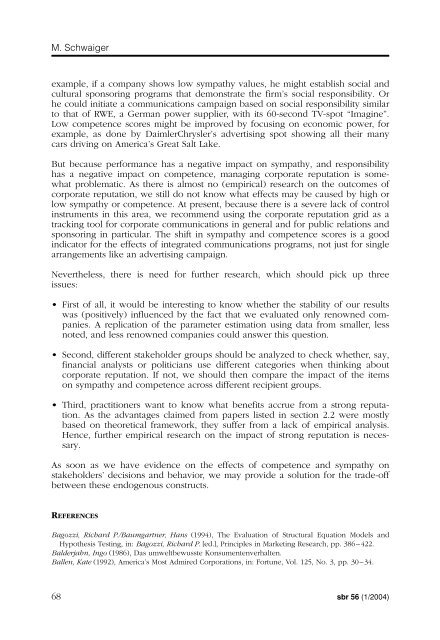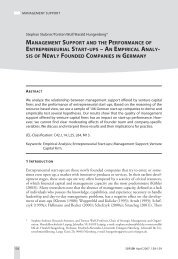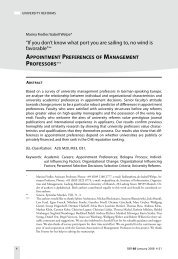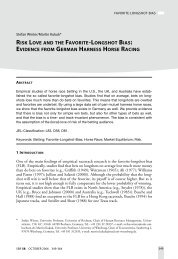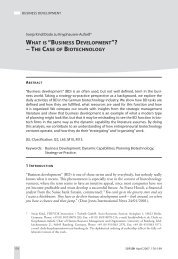components and parameters of corporate reputation - sbr ...
components and parameters of corporate reputation - sbr ...
components and parameters of corporate reputation - sbr ...
Create successful ePaper yourself
Turn your PDF publications into a flip-book with our unique Google optimized e-Paper software.
M. Schwaiger<br />
example, if a company shows low sympathy values, he might establish social <strong>and</strong><br />
cultural sponsoring programs that demonstrate the firm’s social responsibility. Or<br />
he could initiate a communications campaign based on social responsibility similar<br />
to that <strong>of</strong> RWE, a German power supplier, with its 60-second TV-spot “Imagine”.<br />
Low competence scores might be improved by focusing on economic power, for<br />
example, as done by DaimlerChrysler’s advertising spot showing all their many<br />
cars driving on America’s Great Salt Lake.<br />
But because performance has a negative impact on sympathy, <strong>and</strong> responsibility<br />
has a negative impact on competence, managing <strong>corporate</strong> <strong>reputation</strong> is somewhat<br />
problematic. As there is almost no (empirical) research on the outcomes <strong>of</strong><br />
<strong>corporate</strong> <strong>reputation</strong>, we still do not know what effects may be caused by high or<br />
low sympathy or competence. At present, because there is a severe lack <strong>of</strong> control<br />
instruments in this area, we recommend using the <strong>corporate</strong> <strong>reputation</strong> grid as a<br />
tracking tool for <strong>corporate</strong> communications in general <strong>and</strong> for public relations <strong>and</strong><br />
sponsoring in particular. The shift in sympathy <strong>and</strong> competence scores is a good<br />
indicator for the effects <strong>of</strong> integrated communications programs, not just for single<br />
arrangements like an advertising campaign.<br />
Nevertheless, there is need for further research, which should pick up three<br />
issues:<br />
• First <strong>of</strong> all, it would be interesting to know whether the stability <strong>of</strong> our results<br />
was (positively) influenced by the fact that we evaluated only renowned companies.<br />
A replication <strong>of</strong> the parameter estimation using data from smaller, less<br />
noted, <strong>and</strong> less renowned companies could answer this question.<br />
• Second, different stakeholder groups should be analyzed to check whether, say,<br />
financial analysts or politicians use different categories when thinking about<br />
<strong>corporate</strong> <strong>reputation</strong>. If not, we should then compare the impact <strong>of</strong> the items<br />
on sympathy <strong>and</strong> competence across different recipient groups.<br />
• Third, practitioners want to know what benefits accrue from a strong <strong>reputation</strong>.<br />
As the advantages claimed from papers listed in section 2.2 were mostly<br />
based on theoretical framework, they suffer from a lack <strong>of</strong> empirical analysis.<br />
Hence, further empirical research on the impact <strong>of</strong> strong <strong>reputation</strong> is necessary.<br />
As soon as we have evidence on the effects <strong>of</strong> competence <strong>and</strong> sympathy on<br />
stakeholders’ decisions <strong>and</strong> behavior, we may provide a solution for the trade-<strong>of</strong>f<br />
between these endogenous constructs.<br />
REFERENCES<br />
Bagozzi, Richard P./Baumgartner, Hans (1994), The Evaluation <strong>of</strong> Structural Equation Models <strong>and</strong><br />
Hypothesis Testing, in: Bagozzi, Richard P. [ed.], Principles in Marketing Research, pp. 386 – 422.<br />
Balderjahn, Ingo (1986), Das umweltbewusste Konsumentenverhalten.<br />
Ballen, Kate (1992), America’s Most Admired Corporations, in: Fortune, Vol. 125, No. 3, pp. 30 – 34.<br />
68 <strong>sbr</strong> 56 (1/2004)


